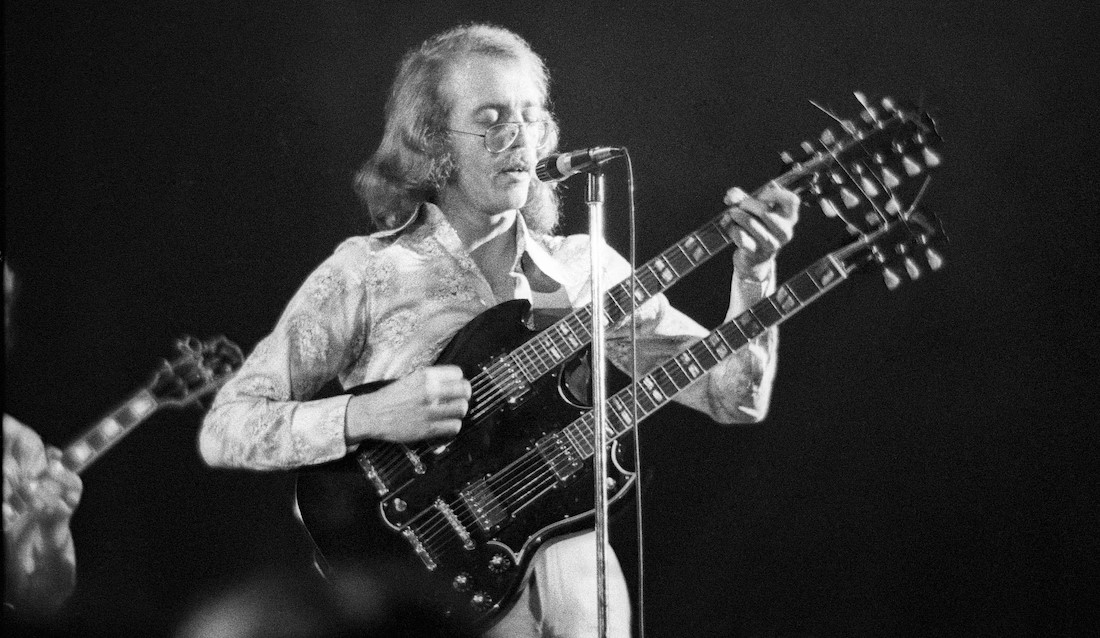Guitarist and singer Bob Welch first made his mark on the music scene as a member of the blues-rock group Fleetwood Mac during the early 1970s. Although he departed the band before it achieved the height of its popular and critical fame, Welch remained active in rock music, playing briefly with a hard rock group before striking out on a successful solo career during the late 1970s. His 1977 solo debut, French Kiss, contained the hit single “Sentimental Lady” and racked up platinum-level sales of more than one million copies. Welch continued to release solo material, albeit to a steadily diminishing audience, until the mid-1980s. His legal battles with his former band Fleetwood Mac may have kept the artist from attaining membership in the Rock and Roll Hall of Fame the following decade–he was the only early group member excluded from admission–and he never managed to regain the high profile of his early performing career. Welch died in 2012.
Played With Fleetwood Mac
Born Robert Lawrence Welch Jr. on either August 31, 1945 or July 31, 1946 (sources disagree), Welch was the son of a Hollywood producer, Robert L. Welch, and an actress, Templeton Fox. He was exposed to the world of show business from a young age and became interested in music, particularly jazz and blues. “Jonathan Winters would come to the house. Yul Brynner lived across the street,” he recalled in a 2003 interview with Tim Ghianni of the Tennessean. After high school, he moved to Paris, France, to study French at the city’s prestigious Sorbonne University. During his college years, Welch studied little and never completed his degree; instead he honed his guitar skills, playing with both European and American musicians.
In 1971, he was asked to join the rock group Fleetwood Mac after the departure of original members Peter Green and Jeremy Spencer. Welch sang and played guitar on five Fleetwood Mac albums: 1971’s Future Games, 1972’s Bare Trees, 1973’s Penguin and Mystery to Me, and 1974’s Heroes are Hard to Find. But band members did not always get along, and the group was rocky both personally and professionally. Welch decided to leave Fleetwood Mac in 1974, shortly before the addition of Stevie Nicks and Lindsey Buckingham helped create a sound that made the outfit one of rock music’s most popular bands.
Welch next formed a hard rock band called Paris with former Jethro Tull bassist Glenn Cornick and former Nazz drummer Thom Mooney. The trio released two albums in 1976, Paris and Big Towne 2061. The albums were not critically or commercial successful, however, and the group disbanded in 1977. Welch then adopted a more straightforward pop sound to attempt a solo career. His 1977 debut, French Kiss, unquestionably achieved that goal. The single “Sentimental Lady” became a top ten hit, and French Kiss went platinum despite peaking at just number 12 on the Billboard 200. Welch’s follow-ups failed to match this early solo success, however. His second album, the gold-selling Three Hearts, appeared to somewhat more modest chart success the following year, thanks to the popularity of the single “Precious Eyes.” But neither 1979’s The Other One nor 1980’s Man Overboard made much of an impact on listeners, and 1981’s Bob Welch and 1983’s Eye Contact passed by largely unnoticed.
Launched Solo Career
With his solo recording career in a lull, Welch spent the 1980s and 1990s beginning new musical pursuits. By 1987, he had moved to Phoenix, Arizona, where he formed a rock group called Avenue M that released just one song during its short career. During the 1990s, he left Arizona for Nashville, where he established himself as a songwriter. Artists including Kenny Rogers, the Pointer Sisters, and Sammy Hagar recorded some of Welch’s songs. Later in the decade, he released a jazz and be-bop album titled Bob Welch Looks at Bop.
In 1994, Welch filed a lawsuit against some of his former Fleetwood Mac contemporaries claiming that he had been underpaid royalties from recordings that he had made with the group. The lawsuit was settled in 1996, but bad feelings over the matter lingered; when Fleetwood Mac was inducted into the Rock and Roll Hall of Fame in 1998, Welch was excluded. Officials at the Hall stated that the decision was made because his contributions to the band had preceded what they considered the pinnacle of its artistic achievement during the mid-1970s, but Welch argued that it was a result of the tensions over the lawsuit. “The whole incident with the rock hall is embarrassing to me personally,” he told Michael Norman of the Cleveland Plain-Dealer at the time. “Mick and I co-managed the group for years. I’m the one who brought the band to Los Angeles from England, which put them in the position of hooking up with Lindsey and Stevie. I saw the band through a whole period where they barely survived, literally,” he concluded.
Toward the end of his life, the artist suffered from major health problems, and he underwent spinal surgery in the months preceding his death. Troubled over the prospect of life with extreme physical challenges, Welch died on June 7, 2012, at his home in Nashville as the result of a self-inflected gunshot wound. “It had become apparent to Bob that he was not going to recover, that he was going to become an invalid,” friend Bart Herbison told Nicole Young of the Tennessean. “He had seen his father become an invalid and watched his mother care for him for many years. In the letter he left, he told (his wife) Wendy, ‘I’m not going to do this to you.'” He was survived by his wife and by his musical catalog. In Welch’s obituary posted by Reuters, Mick Fleetwood was quoted as saying that Welch “was a huge part of our history which sometimes gets forgotten. … Mostly his legacy would be his songwriting abilities that he brought to Fleetwood Mac, which will survive all of us. If you look into our musical history, you’ll see a huge period that was completely ensconced in Bob’s work.”
PERSONAL INFORMATION:
Born Robert Lawrence Welch Jr. on either August 31, 1945, or July 31, 1946 in Los Angeles, CA; died on June 7, 2012, in Nashville, TN; son of Robert L. Welch (a film producer) and Templeton Fox (an actress); married to Wendy. Addresses: Web site–Bob Welch Official Web site: http://www.bobwelch.com/.
CAREER:
Played with Fleetwood Mac, 1971-75; played with Paris, 1975-77; launched solo career, released French Kiss, 1977; Three Hearts, 1978; The Other One, 1979; Man Overboard, 1980; Bob Welch, 1981; Eye Contact, 1983; formed short-lived band Avenue M, 1987; worked as a songwriter, 1990s-2000s; released Bob Welch Looks at Bop, 1999.
WORKS:
Selected discography
With Fleetwood Mac
Future Games, Reprise, 1971.
Bare Trees, Reprise, 1972.
Penguin, Reprise, 1973.
Mystery to Me, Reprise, 1973.
Heroes Are Hard to Find, Reprise, 1974.
With Paris
Paris, Capitol, 1976.
Big Towne, 2061 Capitol, 1976.
Solo
French Kiss, Capitol, 1977.
Three Hearts, Capitol, 1978.
The Other One, Capitol, 1979.
Man Overboard, Capitol, 1980.
Bob Welch, RCA, 1981.
Eye Contact, RCA, 1983.
Bob Welch Looks at Bop, Cigar Music, 1999.
FURTHER READINGS:
Sources
Periodicals
Daily Telegraph (London, England), June 9, 2012.
Plain-Dealer (Cleveland, OH), February 15, 1998.
Tennessean, October 23, 2003; June 7, 2012.
Washington Post, June 8, 2012.
Online
“Biography,” AllMusic, http://www.allmusic.com/artist/bob-welch-mn0000064961#discography (January 10, 2013).
“Ex-Fleetwood Mac member Bob Welch dead,” Reuters, http://www.reuters.com/article/2012/06/08/entertainment-us-bobwelch-fleetwoodmac-idUSBRE8561E720120608 (January 10, 2013).
“Bob Welch: Fleetwood Mac’s prodigal son.” Teen Magazine, May 1978, p. 90. Biography In Context.


